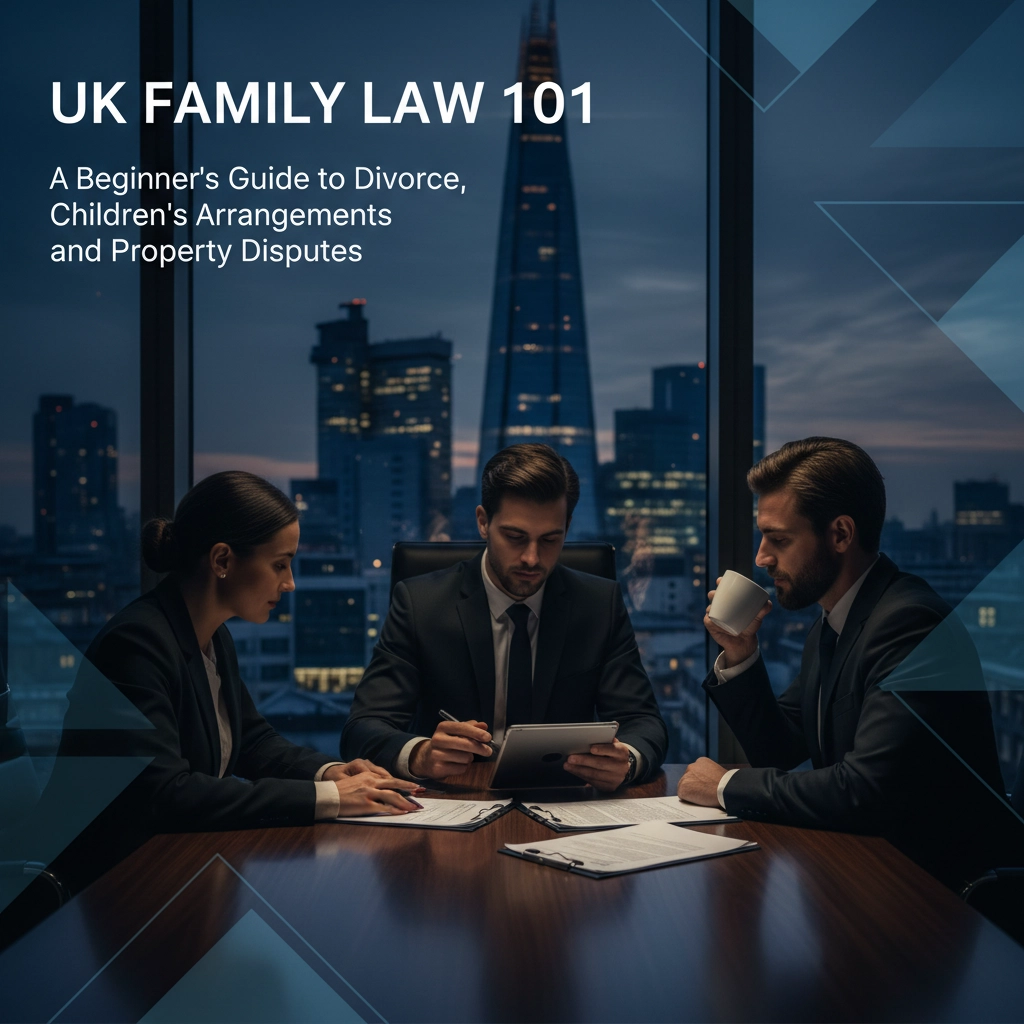
If you’re facing separation, divorce, or family disputes, you’re probably feeling overwhelmed by legal jargon and complex processes. We understand, family law can seem daunting when you’re already dealing with emotional stress. That’s why we’ve created this straightforward guide to help you navigate the basics of UK family law in 2025.
You’ll learn what family law covers, how divorce works under the new no-fault system, what happens with children’s arrangements, and how property gets divided. Most importantly, you’ll understand your options and next steps, so you can make informed decisions during this challenging time.
What Does UK Family Law Actually Cover?
Family law in England and Wales exists to resolve disputes fairly whilst protecting everyone’s rights, especially children’s. It’s the legal framework that handles relationships from start to finish, covering everything that happens when families change or break down.
The main areas we see families dealing with include:
- Marriage and civil partnerships (including same-sex marriages since 2014)
- Divorce and dissolution of civil partnerships
- Children’s living arrangements and contact with both parents
- Financial settlements including property, pensions, and maintenance
- Domestic abuse protection and restraining orders
- Adoption and surrogacy matters
- Parental responsibility disputes

Here’s what makes UK family law different: the courts always put children’s welfare first. This means if you have children, any decisions about money, property, or living arrangements will be made based on what’s best for them, not what’s most convenient for the adults involved.
Scotland and Northern Ireland have separate legal systems, so if you live there, different rules apply. We’re focusing on England and Wales here, where most UK family law cases are handled.
How Divorce Works in 2025: The No-Fault Revolution
The biggest change to UK family law in recent years happened in April 2022 when “no-fault divorce” was introduced. This transformed how couples can end their marriages.
What No-Fault Divorce Means for You
Previously, you had to prove your spouse was at fault, through adultery, unreasonable behaviour, or desertion, or live apart for at least two years. Now, you simply need to state that your marriage has “irretrievably broken down.” No blame, no accusations, no washing dirty laundry in court documents.
This change has made divorce less adversarial and often quicker. You can apply jointly with your spouse or alone. The process typically takes around 6-8 months from start to finish, assuming no complications arise.
The Practical Steps
Getting divorced costs £612 in court fees. You pay this when you submit your application, usually online by debit or credit card through the government’s digital service. If you apply jointly, one of you pays at the time and you can agree to split the cost between you. If a solicitor applies for you, they normally take the payment from you and pay the court on your behalf. Most of the time the applicant pays, but you can agree for the other person to contribute or reimburse you later as part of your financial agreement. If you’re on certain benefits or a low income, you may get a reduction or a full waiver through the Help with Fees scheme.
Before applying, you’ll need to show you’ve considered mediation. This isn’t just a box-ticking exercise, courts genuinely want to see that you’ve tried to resolve issues without lengthy legal battles.
One important point: divorce itself doesn’t automatically sort out money or children’s arrangements. These are separate legal processes that run alongside or after your divorce.
Children’s Arrangements: Putting Kids First
When parents separate, children often feel caught in the middle. UK family law recognises this and has clear frameworks to protect children whilst maintaining their relationships with both parents wherever possible.
What Are Children’s Arrangements?
“Children’s arrangements” replaced the old terms “custody” and “access” in 2014. It’s a more modern approach that focuses on practical arrangements rather than who “owns” the children.
The arrangements typically cover:
- Where children live (primary residence)
- When they spend time with the other parent
- How they communicate with both parents
- Special occasions like birthdays and holidays
- Who makes important decisions about education, healthcare, and religion

Creating Arrangements That Work
We always encourage parents to agree arrangements between themselves first. Children do better when their parents can cooperate, even after separation. If you can agree, you don’t need court involvement, just make sure your agreement is clear and practical.
When parents can’t agree, the court can make a Child Arrangements Order. But here’s the thing: courts prefer parents to try mediation first. It’s less stressful for everyone, especially children, and often produces better long-term results.
The court’s only concern is what’s best for your children. They’ll consider factors like:
- Children’s own wishes (depending on their age and maturity)
- Their physical and emotional needs
- The likely effect of any changes to their circumstances
- Each parent’s ability to meet the children’s needs
- Any risk of harm
Property and Financial Disputes: Dividing Your Life
Money matters often cause the biggest arguments in divorce. Who gets the house? How do you split pensions built up over 20 years? What about debts?
UK family law aims for fairness, but “fair” doesn’t always mean “equal.” Courts consider multiple factors when dividing finances.
What Gets Divided?
Everything counts as part of the “matrimonial pot”:
- Property (family home, buy-to-let properties, overseas assets)
- Pensions (often the most valuable asset after property)
- Savings and investments
- Business interests
- Debts (mortgages, credit cards, loans)
- Future earning capacity
How Courts Decide
First, courts look at both parties’ needs, particularly if there are children involved. The parent with primary care of the children usually needs stable housing, for example.
Then they consider other factors:
- How long you were married
- What each person contributed (financially and non-financially)
- Age and health of both parties
- Standard of living during marriage
- Future earning potential
Important: If you weren’t married, different rules apply. Unmarried couples have far fewer financial rights, regardless of how long you lived together. This catches many people off-guard.

Understanding the Court Process
Most family law issues don’t actually end up in court. But when they do, knowing what to expect helps reduce anxiety.
Before Court: Mandatory Steps
For most family disputes, you must try mediation first. This shows the court you’ve attempted to resolve matters amicably. Mediation involves a neutral third party helping you negotiate agreements.
You’ll also need to complete specific court forms and pay fees. The complexity depends on what you’re asking the court to decide.
What Happens in Family Court
Family courts in England and Wales handle these matters daily. The atmosphere is less formal than criminal courts, judges understand you’re dealing with personal, emotional issues.
For children’s matters, courts often use a process called “CAFCASS” (Children and Family Court Advisory and Support Service). CAFCASS officers may speak with your children and make recommendations to the judge about what’s in their best interests.
Financial cases often require detailed disclosure, you’ll need to provide evidence of all your assets, debts, income, and expenses. Courts take a dim view of people who try to hide assets.
Alternatives to Court: Better Ways Forward
Going to court should be your last resort, not your first option. Other approaches often work better for families.
Family Mediation
Mediation helps couples negotiate agreements with a neutral mediator’s help. It’s confidential, usually faster than court, and often less expensive. Most importantly, you stay in control of the decisions rather than having a judge impose solutions.
Mediation works particularly well for children’s arrangements because it helps parents learn to communicate better, a skill they’ll need throughout their children’s lives.
Collaborative Law
This newer approach involves both parties working with specially trained lawyers to reach agreements without going to court. Everyone signs an agreement that if the process breaks down, the lawyers can’t represent either party in subsequent court proceedings. This creates strong incentives to make collaboration work.
Direct Negotiation
Sometimes couples can negotiate directly, perhaps with solicitors providing background advice. This works best when both parties are reasonable and there’s no power imbalance or domestic abuse concerns.

Getting Professional Help: When and Why
Family law affects your future financial security and your relationship with your children. Getting proper legal advice early often saves money and stress later.
When You Need a Solicitor
Consider professional help if:
- Your situation involves significant assets or complex finances
- There are concerns about domestic abuse
- Your ex-partner has legal representation
- Children’s safety is at risk
- You’re struggling to understand your rights or options
Legal Aid and Support
Legal aid for family law is limited but still available in certain circumstances:
- Cases involving domestic violence or abuse
- Child protection matters
- Some cases involving children being taken into care
Even if you don’t qualify for legal aid, many solicitors offer payment plans or unbundled services where you pay for specific advice rather than full representation.
Questions to Ask Any Solicitor
- How much experience do they have with cases like yours?
- What are their fees and payment options?
- How will they communicate with you throughout the process?
- What’s their approach to resolving matters, court-focused or settlement-focused?
Your Next Steps
Family law problems feel overwhelming because they affect every aspect of your life. But thousands of people navigate these challenges successfully every year.
Start by understanding your situation clearly. What exactly needs to be resolved? Are you dealing with divorce, children’s arrangements, finances, or all three? Each area might need different approaches or timelines.
Consider mediation or other alternatives to court first. They’re often quicker, less stressful, and give you more control over outcomes.
Get professional advice appropriate to your situation’s complexity and your budget. Even a one-hour consultation can clarify your position and options significantly.
Most importantly, remember that family law exists to help families transition fairly through difficult times. The system isn’t perfect, but it’s designed with children’s welfare at its heart and aims for fair outcomes for everyone involved.
Frequently Asked Questions
What’s the fastest way to get divorced in England and Wales?
With no-fault divorce, the process typically takes 6-8 months if uncontested. You can apply online, and if you and your spouse agree on everything (including children and finances), it can be straightforward. However, sorting out finances and children’s arrangements often takes longer than the divorce itself.
Do I need a solicitor for my divorce?
Not necessarily. If your divorce is uncontested and you have no children or significant assets, you might manage the process yourself using online services. However, if there are children, property, pensions, or disagreements involved, professional advice usually saves money in the long run.
How much does family mediation cost?
Costs vary widely, typically ranging from £100-£150 per hour per person. Many people find mediation less expensive than going to court, which can cost thousands of pounds. Some mediators offer reduced rates based on income, and the first session is sometimes free.
What happens if my ex-partner won’t agree to children’s arrangements?
If you can’t agree through discussion or mediation, you can apply to court for a Child Arrangements Order. The court will consider what’s best for your children and may involve CAFCASS to assess the situation. The process usually takes several months.
Can I change children’s arrangements later if circumstances change?
Yes, arrangements can be modified if there’s a significant change in circumstances: like relocation, job changes, or children’s changing needs. It’s better to agree changes between yourselves, but you can apply to court for variation orders if necessary.
What if we weren’t married: do I have any financial rights?
Unmarried couples have very limited financial rights compared to married couples, regardless of how long you lived together. You might have claims relating to property you own jointly or children you have together, but there’s no equivalent to spousal maintenance or automatic property rights.




















